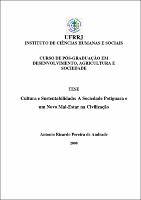Por favor, use este identificador para citar o enlazar este ítem:
http://rima110.im.ufrrj.br:8080/jspui/handle/20.500.14407/12707| metadata.dc.type: | Tese |
| Título : | Cultura e sustentabilidade: a sociedade potiguara e um novo mal-estar na civilização |
| Otros títulos : | Culture and sustainability: potiguara society and the new discontents with civilization |
| metadata.dc.creator: | Andrade, Antonio Ricardo Pereira de |
| metadata.dc.contributor.advisor1: | Alimonda, Héctor Alberto |
| metadata.dc.description.resumo: | Investiga as relações entre cultura, tradição e sustentabilidade no território dos índios potiguara na Paraíba, partindo de estudos anteriores ali realizados sobre a questão ambiental, de observações etnográficas gerais e especificamente da análise de histórias de vida de nativos potiguara. As análises extrapolam, quando necessário, o eixo local para realizar uma síntese paralela da evolução histórica da civilização ocidental, sob o ponto de vista da temática em apreço, e das condições globais na atualidade, que parecem manifestar, numa outra dimensão, os mesmos problemas vivenciados na micro-região de influência dos índios potiguara. As reflexões envolvem mais detidamente os conceitos de culturas populares x cultura hegemônica propostos por García Canclini, o conceito de populações tradicionais tal como proposto por Diegues, a noção de desenvolvimento sustentável sugerida pela Comissão Mundial (da ONU) sobre Meio Ambiente e Desenvolvimento. Envolve também, o debate entre fronteiras étnicas e identidade, atualizado recentemente por Fredrik Barth, embora embrionário no pensamento sócio-antropológico e psicossocial tal como revelam as abordagens de Marx e Freud. Tais abordagens confluem, respectivamente, a partir do caminho das disputas econômicas e territoriais e do caminho da economia das pulsões instintivas inatas e seus padrões específicos de acomodação para justificar as diversas etapas do processo civilizatório. Nesta mesma linha debate-se a abordagem de Norbert Elias que, de alguma forma, tenta recolocar o problema das fronteiras étnicas no âmbito meramente cultural, das disputas simbólicas. Em síntese, concluímos por apreciar uma extraordinária, embora não tão surpreendente, semelhança entre as condições centrais e os problemas derivados da atual e efervescente sociedade potiguara na busca de sua paradoxal utopia civilizatória/tradicional e o que poderíamos chamar, retomando os arroubos sóciopsicológicos da maturidade freudiana, de um novo e contundente mal estar na civilização global. |
| Resumen : | It investigates the relationships that involve culture, tradition and sustainability in the territory of the Potiguara Indians in Brazil, starting from previous studies on the local environmental, on general ethnographic observations and specifically on the analysis of the histories of life of native people, extrapolating occasionally towards a parallel synthesis of the historical evolution of the western civilization and of present global condition, in terms of those mentioned relationships, which manifest in another dimension of the same problems observed on the micro-region of influence of the Potiguara Indians. The reflections involve, more carefully, the concepts of popular cultures x hegemonic culture proposed by García Canclini, the concept of traditional populations just as proposed by Diegues, the notion of sustainable development suggested by the World Commission (of UN) on Environment and Development and the debate between ethnic borders and identity, updated recently by Fredrik Barth, although embryonic in the social-anthropological and psychosocial thought as revealed, for instance and, somewhat, more categorically in Marx's and Freud s converging approaches, starting respectively from the economical and territorial disputes and from that of innate instinctive drives economy and their specific patterns of accommodation in the several stages of a civilization process and Norbert Elias' controversial approach assuming that of such tensions tend to be related more closely to the cultural system, and symbolic disputes. In synthesis, we ended for appreciating an extraordinary, although not so surprising, similarity between the central conditions and the derived problems of the current and effervescent Potiguara society in the search of its paradoxical civilized/traditional utopia and what could called, reviving the social-psychological intents of the Freudian maturity, the new and contusing discontents with global civilization. |
| Palabras clave : | sustainable development traditional culture Potiguara Brazil. desenvolvimento sustentável Ccultura tradicional reprodução |
| metadata.dc.subject.cnpq: | Antropologia |
| metadata.dc.language: | por |
| metadata.dc.publisher.country: | Brasil |
| Editorial : | Universidade Federal Rural do Rio de Janeiro |
| metadata.dc.publisher.initials: | UFRRJ |
| metadata.dc.publisher.department: | Instituto de Ciências Humanas e Sociais |
| metadata.dc.publisher.program: | Programa de Pós-Graduação em Ciências Sociais em Desenvolvimento, Agricultura e Sociedade |
| Citación : | ANDRADE, Antonio Ricardo Pereira de. Cultura e sustentabilidade: a sociedade potiguara e um novo mal-estar na civilização. 2008. 183 f. Tese (Doutorado em Ciências Sociais em Desenvolvimento, Agricultura e Sociedade) - Instituto de Ciências Humanas e Sociais, Universidade Federal Rural do Rio de Janeiro, Seropédica - RJ, 2008. |
| metadata.dc.rights: | Acesso Aberto |
| URI : | https://rima.ufrrj.br/jspui/handle/20.500.14407/12707 |
| Fecha de publicación : | 26-nov-2008 |
| Aparece en las colecciones: | Doutorado em Ciências Sociais em Desenvolvimento, Agricultura e Sociedade |
Se for cadastrado no RIMA, poderá receber informações por email.
Se ainda não tem uma conta, cadastre-se aqui!
Ficheros en este ítem:
| Fichero | Descripción | Tamaño | Formato | |
|---|---|---|---|---|
| 2008 - Antonio Ricardo Pereira de Andrade.pdf | 3.98 MB | Adobe PDF |  Visualizar/Abrir |
Los ítems de DSpace están protegidos por copyright, con todos los derechos reservados, a menos que se indique lo contrario.

